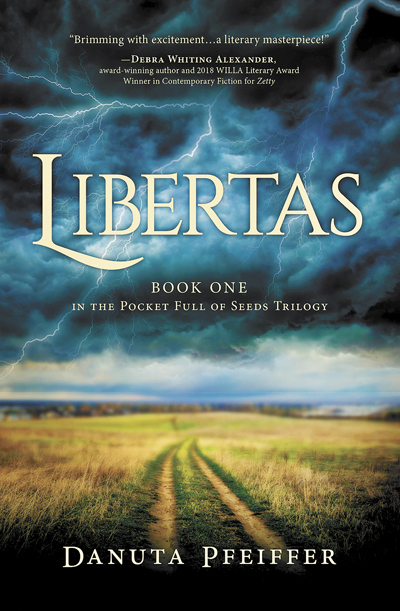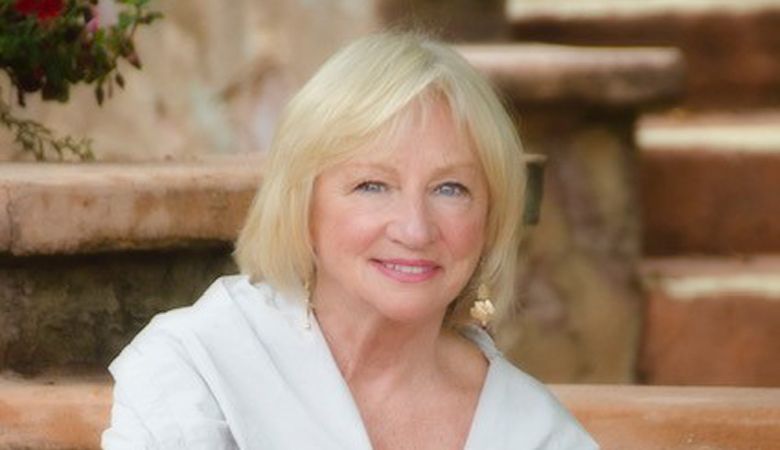Q&A: Danuta Pfeiffer
Author, winery owner, history lover
Pfeiffer Winery owner/author Danuta Pfeiffer adds another book to her impressive portfolio with “Libertas,” the first in her “Pocket Full of Seeds” trilogy. Released in May by Luminare Press, the novel is “a love story rising from the despair of slavery. Fredericka is the daughter of a white plantation owner and his Black house slave. Horace is a literate slave-companion to the son of a New York hotel baron.” Pfeiffer published her award-winning memoir, “Chiseled,” in 2015.
What was the inspiration in starting the trilogy?
DP: My husband, Robin, told me the legend of a family who once lived on our vineyard property when it was a hay farm about 120 years or so ago. Their hay wagon tipped over and the son was killed. The distraught father shot the horses where they lay and the family left and never returned. I wondered about a backstory to that legend beginning with a lot of “what ifs” and came up with this historical fiction of escaped slaves on the Oregon Trail.

What does “Pocket Full of Seeds” refer to?
DP: “Pocket Full of Seeds” refers to a habit my protagonist, Fredericka, has of collecting seeds, her only possessions. It also begets a lovely metaphor of planting seeds of hope for freedom, or “Libertas.” I needed a trilogy to tell the whole saga of the courageous and dangerous exploits early pioneers encountered on this 2,000-mile journey.
What is your method of research in writing a historical novel?
DP: Reading the journals of women who crossed the prairies was invaluable, also the journals of the early explorers, Joel Palmer and Francis Parkman, and the diary of young Virginia Reed with the Donner Party. I dug into the biographies of Harriett Tubman, Frederick Douglass, read the heart-stopping slave narratives and the amazing story of a former slave, Clara Brown, who became a renowned philanthropist and entrepreneur.
I learned what whips were used against the human body, the feel of the lash, the life of a slave, what hope feels like, and freedom when you had none. I had to know what toys children played with, what medicines, food, and clothes people had, how to build a wagon, what liquor they drank and how to cuss, 19th century style.
Any surprises in your research findings?
DP: As for surprises, I could write a book just on those! The midnight tsunami that hit Lake Erie and swallowed half of Buffalo, the horse-tugged boats on the newly constructed Erie Canal, the graves that littered 2,000 miles of wagon trails, the accidents, drownings and diseases the emigrants encountered, the Mormons pushing hand carts across the desert, and the passenger ships that tangled with violent seas sailing around the Horn to San Francisco. I learned how white privilege made all of this a thousand times worse if you were Black. The most surprising was the history of racism and the Ku Klux Klan in Oregon.
Who are some of your favorite authors? How do they influence your writing?
DP: I love Barbara Kingsolver for her storytelling ability. Beryl Markham for her vivid writing skills. Pat Conroy for his ability to make me cry. Charles Frazier for his late 19th-century realism. Dan Brown for writing quick chapter tension. Larry McMurtry for his brilliant characters in “Lonesome Dove.” Wallace Stegner for story structure. Edward Abbey for “Desert Solitaire.” And the poetry of Mary Oliver for keeping me grounded.
Did publishing “Chiseled” change your process of writing this new book?
DP: I became a decent writer for having gone through 25 years writing “Chiseled.” Just like making fine wine, writing begins with good terroir — research and knowledge — then patience to find the right variety of words to fit “the soil” on the page. I learned to create the right trellis system to hold the story together, to prune my words, drop unwanted phrases, remove the suckers that bleed the energy from the story, and harvest a worthy manuscript. After refining it through editors and finding a good publisher, it’s now time to savor it with friends who have a palate for a good story.
How is Book Two coming along?
DP: Faster than Book One. Now that I have the concept and characters, they are playing themselves out in their own story. I feel I’m just channeling them at this point. I’m halfway through the first draft. I hope to have it finished this winter, and published by this time next year.












